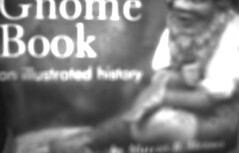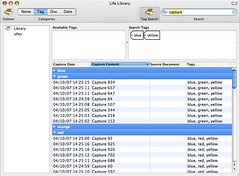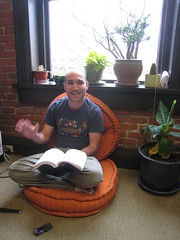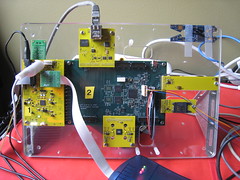
Claes-Fredrik is a cosmopolitan from Sweden, Brazil, the USA and, to a lesser extent, much of the rest of the world. He has worked on world-class software modeling tools and processes from Objectory, Rational and IBM, and spends much of his time coming up with ways to make life more fun and fulfilling.
Posts follow:
Quentin Stafford-Fraser (introduced earlier) recently spoke at the 2007 GOVIS conference.
His first talk, ‘Changing the Face of the PC’, tells the story of the creation of Ndiyo, DisplayLink, and Cambridge Visual Networks, the technologies and motivations behind them, and some thoughts about the future.
Quentin and Martin King are founders of DisplayLink (formerly Newnham Research) as well as Exbiblio.
The second talk was focused on Exbiblio—our vision, technology, company, values, and more. Please have a look, to see who we are, what we are doing, and how we intend to do it:
View on Google Video
Videos to download: (right-click to save to disk):
For iPod (71 MB)
High-quality MP4 (162 MB)

This work is licensed under a Creative Commons Attribution-Noncommercial-No Derivative Works 3.0 License.
 Posted in All | Comments Off on The Paper Renaissance | Other posts by Claes-Fredrik
Posted in All | Comments Off on The Paper Renaissance | Other posts by Claes-Fredrik
 We’ve been having trouble getting the image sensor data through to the main memory on the Rosencrantz form factor board, but today, Oscar, from Synapse, figured it out.
We’ve been having trouble getting the image sensor data through to the main memory on the Rosencrantz form factor board, but today, Oscar, from Synapse, figured it out.
Getting the image processing unit (IPU) configuration right in the iMX31 has been a difficult task, and as of yesterday, we were getting images through, but only half an image frame’s worth of data per frame. Today, Oscar triumphantly sent us a picture of a gnome taken with the form factor board.
This takes a major concern off our shoulders.
 Posted in All | Comments Off on Rosencrantz Image Sensor Driver | Other posts by Claes-Fredrik
Posted in All | Comments Off on Rosencrantz Image Sensor Driver | Other posts by Claes-Fredrik
 On the software side, we’ve also undergone quite a bit of evolution.
On the software side, we’ve also undergone quite a bit of evolution.
In its previous incarnation, the Exbiblio system comprised components written using a variety of computer languages and technologies, such as C, C++, Objective-C, C#, AppleScript, Visual Basic for Applications, and Java (many or all of which will resurface over time). We were trying to leverage each contributor to their fullest by keeping them working in their most familiar environment, at the cost of more complex communication between the components. We were also trying to build in a lot of flexibility by having separate processes communicating with each other, at the cost of simple installation and maintenance. Read the rest of this entry »
 Some people know how to decorate their office.
Some people know how to decorate their office.
 I feel a bit intimidated by the idea of presenting what we’ve done since we last posted updates on the software and hardware development. I think I’ll let the overview slip a bit, and get started with a few recent tidbits.
I feel a bit intimidated by the idea of presenting what we’ve done since we last posted updates on the software and hardware development. I think I’ll let the overview slip a bit, and get started with a few recent tidbits.
We just reached some very exciting milestones on the hardware side, in that we got our first form-factor boards in, as well as early samples of the case. The boards don’t yet have the components placed on them, but they will be “stuffed” shortly. Read the rest of this entry »
“Until now, in most parts of the world, Web surfing has been separate from everyday activities like riding the train, watching television and driving. But the new technology may erode that distinction.
““You’ve picked up this product, and you don’t want to go back to your PC,” said Tim Kindberg, a senior research at the Bristol, England, lab of Hewlett-Packard. “Or you’re outside this building, and you want more information. We call it the ‘physical hyperlink.’ ””
So read some quotes from, well, let’s try what we’re calling the Exbiblio Eureka: 6 words in sequence are a URL (in this case 8 works slightly better):
A a search on Google reveals that the article appeared in
The New York Times
The Orlando Sentinel
The Denver Post
Debit Card News
Signal Lake
What’s so exciting about Exbiblio and the oPen™, is that you don’t need the bar codes. You can do the same thing without them, using the Eureka and a great capturing device.

 Claes-Fredrik is a cosmopolitan from Sweden, Brazil, the USA and, to a lesser extent, much of the rest of the world. He has worked on world-class software modeling tools and processes from Objectory, Rational and IBM, and spends much of his time coming up with ways to make life more fun and fulfilling.
Claes-Fredrik is a cosmopolitan from Sweden, Brazil, the USA and, to a lesser extent, much of the rest of the world. He has worked on world-class software modeling tools and processes from Objectory, Rational and IBM, and spends much of his time coming up with ways to make life more fun and fulfilling.



